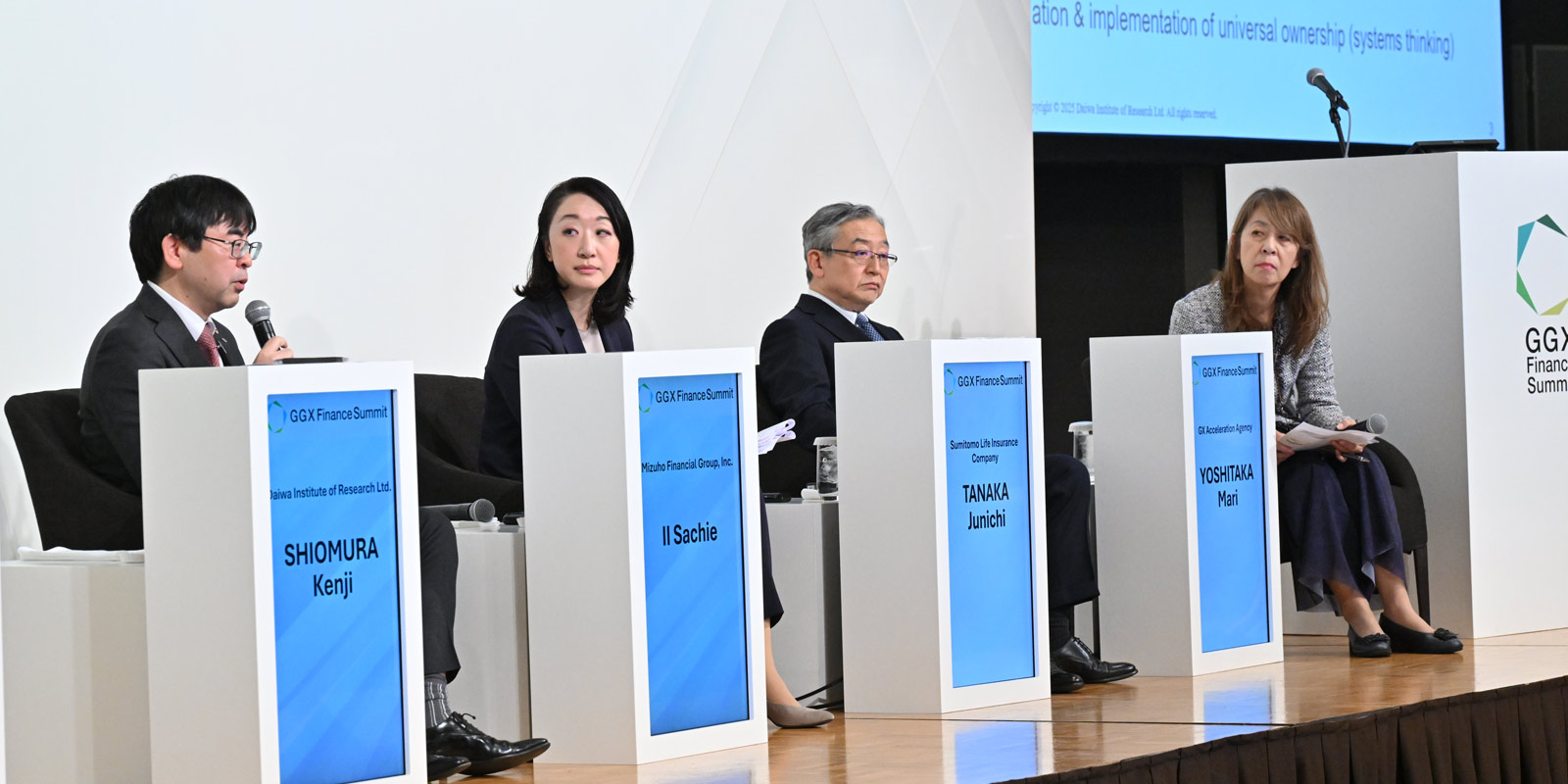Video Distribution
GGX Finance Summit 2025 concluded on November 5th. You can watch the conference videos below.
The Overview of GGX Finance Summit 2025
- Date & Time: November 5th, 2025 (Wed.) 10:00-16:45 (JST)
- Format: Hybrid (On-Site/ On-Line)
- Host: Ministry of Economy, Trade and Industry (METI) / GX Acceleration Agency (GXA)
- Co-Hosts: WBCSD (World Business Counsil for Sustainable Development) / TCFD Consortium
- Participants: Approximately 510 attendees from financial institutions, business corporations, academia, and other sectors (around 160 participated in person)
Summary of the Event
The Ministry of Economy, Trade and Industry (METI) and the GX Acceleration Agency (GXA) held the GGX Finance Summit on Wednesday, November 5, to further advance discussions on transition finance and the promotion of industrial GX, strengthen collaboration among the public, private, and financial sectors, and lead the development of international rules that enable both emissions reductions and economic growth.
The Summit featured four panel discussions:
(1) global trend towards carbon neutrality and expectations for Japan's GX;
(2) expanding the base of financiers in Japan's transition finance;
(3) how to promote transition finance in Asia; and
(4) how to build GX market through enhanced disclosure.
Experts from Japan and abroad offered their perspectives on each theme, and participants held discussions on the actions needed to realize GX going forward.
Summary of Discussion
Opening Remarks
TSUTSUI Yoshinobu (Chairperson, GX Acceleration Agency)
- Even amid an increasingly uncertain global landscape, Japan is steadfastly pursuing a strategic path that advances decarbonization and strengthens industrial competitiveness and sustainable economic growth in tandem.
- GXA operates along two core pillars - financial support to promote the social implementation of GX technologies and carbon pricing operations, including the emissions trading scheme to be introduced next fiscal year - and positions a third pillar, a hub function, to connect and mobilize diverse stakeholders in support of GX initiatives.
- GXA is also strengthening its international collaboration through initiatives such as a cooperation agreement with InnoEnergy of the European Union and the establishment of the Global Advisory Council composed of internationally renowned experts.
- During the transition period toward achieving carbon neutrality by 2050, substantial financing needs will arise, particularly for energy infrastructure and high-emission industrial sectors. Effective transition finance and broad collaboration across the public and private sectors - including industry, finance, and supply-chain partners - will be indispensable. GXA will continue to serve as a bridge among these stakeholders in fulfilling its mission.

ITO Sadanori (Director-General, GX Policy Group, Ministry of Economy, Trade and Industry (METI))
- The concept of GX is to pursue carbon neutrality through Various Pathways, advancing simultaneously climate change, energy security and economic growth.
- Although the global landscape has changed significantly over the past year, the importance of GX remains unchanged for both Japan and the world. It is therefore essential to implement policies with emphasis on consistency and predictability, and steadily accelerate GX-related investments.
- To realize Japan’s integrated "regulatory-and-support" approach to growth-oriented carbon pricing, the government has already committed 20 trillion yen in upfront investment support. Japan is also preparing to launch the GX emissions trading scheme (GX-ETS) in 2026.
- Japan has been promoting "Transition Finance" to accelerate funding for sectors where a immediate leap to full decarbonization is difficult.
- Across Asia as a whole, the estimated demand for decarbonization finance is said to be around 4000 trillion yen. As part of Japan and Asia’s growth strategy, we aim to contribute to accelerating the transition through initiatives such as AZEC.
- The key to making financing mechanisms work lies in corporate disclosure. The move toward mandatory sustainability disclosure presents an opportunity to direct capital toward GX-related investments. Through initiatives such as the GX Leadership Declaration and the Scope 3 Guidance being developed by the TCFD Consortium, we hope disclosure will become an effort that drives market creation.

Keynote Speech 1
How do we accelerate Japan’s GX?SHIGETAKE Naoki (COO, GX Acceleration Agency)
- Although recent geopolitical developments have prompted some to express reservations about GX efforts, stepping back from decarbonization would not be a strategic choice. The world is not "moving away from decarbonization;" rather, it is shifting its focus toward transition pathways - a direction long championed by Japan. Moreover, taking action precisely when competitors are hesitating is crucial for building a sustainable competitive advantage.
- As outlined in the GX 2040 Vision, Japan must advance both supply-side and demand-side measures. On the supply side, large-scale infrastructure investments and domestic investments that strengthen energy security remain essential. On the demand side, industries need to move forward with initiatives that differentiate environmental value-including Scope 3-tailored to sector-specific priorities. Financial institutions are likewise expected to engage proactively with their clients to encourage the formulation and execution of strategic transition plans.
- In this context, blended finance can serve as an effective tool for addressing GX-specific risks and the substantial long-term financing needs associated with GX projects. In September, the first two projects selected for hydrogen and ammonia price-differential support were announced-initiatives in the Nagoya region and in Kawasaki. Progress is also being made in the steel industry’s efforts to develop next-generation electric arc furnaces. Through well-targeted government support and regulatory reforms, Japan is rapidly advancing regional GX industrial clusters, underscoring the government’s strong commitment to GX as a new growth strategy.
- A key to realizing GX is the market’s ability to properly recognize and accept the additional costs associated with GX as "environmental value." GXA has launched a regular consumer survey to assess public acceptance of environmental value. As detailed in the GX Future Report released today, creating demand for GX-driven products and services is a shared opportunity that all stakeholders should pursue together.
- GX initiatives inherently require cross-sector collaboration, spanning supply chains, industries, and public–private partnerships. GXA will fully leverage its functions-including financial support mechanisms and GX-Hub function-to work collectively toward advancing GX as a core pillar of Japan’s growth strategy.

Panel Discussion 1
Global trend towards carbon neutrality and expectations for Japan's GX(Discussion by GXA Global Advisory Council Members)
- Despite political headwinds and signs of declining government support in some part of the world, expectations for the private sector continue to grow, and investor interest in climate-related solutions has strengthened. Companies, for their part, have not retreated from their commitment to disclosure, recognizing its importance for capital access, business efficiency, and regulatory compliance. Disclosure and engagement have effectively become part of the essential infrastructure of doing businesses. The sustainable finance market likewise remains robust, with little change compared to the last year. More than 90 percent of global investment in power generation continues to be directed towards clean energy.
- To mobilize the investment needed for the transition-including in hard-to-abate sectors-credible transition plans and strong policy and data foundations for disclosure are indispensable. Japan is taking a leading role in advancing GX initiatives, and by sharing case studies and experiences in transition finance-particularly in hard-to-abate industries-it can contribute meaningfully to the global market.
- To unlock high-risk, early-stage GX investments, public-private risk-sharing frameworks are vital, and blended finance will play an increasingly important role in reducing risks in frontier technologies.
- A whole-of-government and whole-of-economy approach is necessary to embed sustainability into national strategy, accompanied by strong impact management and impact measurement practices. Japan’s policy package serves as a credible international model.
- For GXA, it is important to provide platforms for dialogue and collaboration with investors and the private sector, and to share the outcomes of these efforts with a broad range of stakeholders.

Panel Discussion 2
Expanding the Base of Financiers in Japan's Transition Finance- Japan’s transition finance is recognized as being among the most advanced globally. Underpinned by predictable government commitments, it provides an important model in which the public and private sectors share risks to meet financing needs during the transition. For companies-including those in emissions-intensive sectors-the transition to net zero is directly linked to long-term economic and social value. Labeled transition finance instruments and loans based on established frameworks make it easier to articulate investment rationales and to demonstrate alignment within institutional portfolios. At the same time, even investments without transition labels can make substantial contributions to decarbonization, and labeled instruments are not inherently definitive.
- Evaluating transition plans requires a holistic assessment of factors such as technology roadmaps, R&D progress, project viability, capital investment strategies, and workforce and talent-development strategies. Strengthening comprehensive evaluation capabilities remains an important challenge.
- The concept of "avoided emissions" is extremely important, as it directly shapes corporate incentives. It is crucial to build mechanisms in which autonomous efforts are properly rewarded. If avoided emissions metrics become more formally embedded in the concept of transition finance, it will create a positive cycle: investors will find it easier to invest, and companies will be better able to communicate the value of their efforts.
- Transition projects are still largely at the R&D stage, making it difficult for financial institutions to expand lending. A negative cycle persists in which capital investment and financing do not progress because the eventual corporate off-takers remain unclear. Increasing the number of off-takers and ensuring predictability are therefore extremely important.
- Long-term commitments from government, companies, and financial institutions are essential to advancing sustainability challenges, including GX. A shift towards investment behavior that is not constrained by short-term market indicators-such as tracking error-along with strong long-term commitments from corporate leadership and stable policy design, are fundamental prerequisites for a successful transition and for market formation.
- The integration of policies, markets, and education-along with active participation by citizens and consumers-is critical. A sustainable GX ecosystem requires promoting participation through retail products (such as CT bonds), enhancing demand-side awareness, and strengthening engagement with company and financial institutions."

Guest Remarks
HANZAWA Junichi (Chairperson, Japanese Bankers Association)
- The banking sector is working to support decarbonization in the real economy through tailored engagement that reflects the specific characteristics of each client’s industry. The Japanese Bankers Association formulated the "JBA Initiative for Achieving Carbon Neutrality" in 2021, and has since focused on providing information to member banks and presenting views in government forums.
- As one of the financing measures that underpin GX-related investment, the Association is also promoting transition finance. By contributing to discussions on transition plan formulation and communicating the importance of transition finance-an area where Japan has been a global front-runner-the Association aims to help lead international dialogue. While the challenges associated with advancing the transition continue to grow, the banking sector recognizes that supporting stakeholders in moving forward is a critical role for financial institutions. The sector will remain committed to contributing-across the entire industry-to the transition toward a more sustainable, decarbonized society.

UCHIDA Kazuto (President, Government Pension Investment Fund)
- GPIF believes that reducing sustainability-related risks, including climate change, while working to improve the sustainability of the market as a whole, and ensuring market average returns, are essential to improving the long-term investment returns of the entire portfolio. GPIF formulated its Sustainability Investment Principles in March 2025, outlining this philosophy.
- GPIF has been investing based on ESG indices focused on, climate change since 2018, and this summer it began public offerings for new ESG indices and ESG funds. GPIF is also working on sustainability investment in alternative assets as well as traditional assets
- GPIF believes that promoting a virtuous cycle in the investment chain in important to achieving sustainable economic growth, including GX, and ultimately to securing long-term investment returns. To achive this virtuous cycle, as an asset owner, GPIF will work to further promote constructive dialogue between the asset management companies to which it entrusts management and the companies in which it invests.

Panel Discussion 3
How to promote transition finance in Asia- Investment and financing for the energy transition are becoming increasingly necessary, while economic and geopolitical uncertainties continue to rise. In such an environment, transition finance-including for high-emitting industries and emerging economies-is needed as a second pillar alongside with green finance.
- The importance of transition finance is now widely recognized and "Japan’s approach" appears to have gained international visibility. However, differences remain in how the term "transition finance" is understood and in the tendency to narrowly define eligible transition activities.
- To further advance transition finance, it is essential to balance the "credibility" of transition strategies with "inclusiveness," so as not to exclude segments facing capacity constraints (such as Asia, emerging economies, and SMEs) or those lacking incentives (such as companies in advanced economies).
- Overemphasizing credibility could lead to the acceptance that some sectors or regions simply cannot access finance. However, supporting only part of the overall transition while leaving the rest behind is incompatible with the concept of a "Just Transition." A macro-level transition strategy-namely, NDCs-must guide the process, with banks, asset managers, and MDBs working together to provide financing. An exclusionary approach based on "rightness" will not succeed.
- A joint report by ADB, ERIA, and METI focuses on Southeast Asia and presents a roadmap designed to inform policy decisions that can help promote a variety of financing approaches. Clear and credible roadmaps-at the national, sectoral, or corporate level-are essential. There is a wide range of potential transition-related projects-including early retirement of coal-fired power plants, CCS, blue hydrogen, and green steel-but none of these can be realized by a single business operator or financial institution alone. Diverse actors must mobilize capital, and partnerships among industry, finance, government, and even across international and regional boundaries are essential.
- In Asia, many countries see gas-fired power as an important transition energy source. Operators need confidence that gas-fired power can qualify for transition finance. The "Inclusive Approach" discussed in the Japan Public-Private Group on Promoting Transition Finance in Asia must permeate financial institutions and become a shared value.
- The "credibility" of transition finance often hinges on how efforts aligned with current NDCs are evaluated. If initiatives linked to national NDCs are not considered credible and financed, macro-level transition will not be achieved. Government can provide overarching direction through sectoral technology roadmaps and similar tools, complementing the credibility of companies and emerging economies that cannot realize the transition on their own. It is also important to incorporate perspectives from the demand side of financing through international partnerships such as AZEC.

Keynote Speech 2
Toward the Future of Climate DisclosureITO Kunio (Director of Hitotsubashi CFO Education and Research Center / Chair of the TCFD Consortium)
- This year, the TCFD Consortium has been focusing on Scope 3 emissions, from the perspective of encouraging GHG emissions reduction across the entire value chain. However, numerical Scope 3 emissions alone do not necessarily reflect a company’s full efforts to reduce emissions across its value chain. To address this, the Consortium plans to publish a Scope 3 Guidebook by the end of this fiscal year, incorporating sector-specific challenges and disclosure examples, and released an interim report on its website in July 2025.
- From next fiscal year onward, the TCFD Consortium is expected to be re-established under the GX Acceleration Agency as the GX Future Consortium. The new consortium will broaden its discussion themes-from approaches to disclosure, to the creation of markets for GX products, and ultimately to how these efforts should be financed.

Panel Discussion 4
How to build GX Market through enhanced disclosure- Developing and implementing technologies for decarbonization and the transition requires substantial funding, and recovering these investments depends on the creation and growth of a GX market in which green products can be sold with a sufficient environmental premium.
- Both business corporations and financial institutions are advancing various initiatives toward the creation of such a GX market. For example, a Japanese manufacturer is preparing a framework that link GX products with sustainable finance for procurement, enabling customers to access sustainable financing when purchasing such products. Other efforts include developing impact finance focused on emissions reduction contributions and assessments of green enabling projects.
- Institutional investors can contribute to the creation of a GX market by making investment decisions based on a multifaceted assessment of corporate initiatives that support future cash flows and emissions-reduction efforts, while also supporting supply chain management through engagement.
- Within the value chain, it is necessary for banks, trading partners, manufacturers, and end users each to bear a portion of the environmental premium. However, expanding the GX market requires policy support, and the government can provide such support in various ways-including direct support for supply, mandatory procurement schemes, demand-side incentives, and carbon-pricing mechanisms.
- Companies have responsibilities such as maintaining factories, securing suppliers, and providing employment, making large-scale shifts difficult even when market conditions change. Therefore, investors also need to take a long-term perspective, recognizing the importance of investments on a 10-20-year horizon. This requires increasing number of long-term investors who understand that long-term risk–return profiles can be favorable, and also consistent policy signal from the government over time.
- Disclosure should be applied in ways that benefit companies and enhance their motivation. For example, Scope 3 emissions may increase even when sales of high-efficiency products rise, making standalone evaluation difficult; therefore, it is necessary to assess companies using a multifaceted approach that considers product carbon footprints and emissions-reduction contributions. These issues are being discussed within the TCFD Consortium, which is currently developing guidance on Scope 3. Tools and platforms related to emissions-reduction contributions are also being developed internationally, and global standardization efforts-such as sector-specific average emissions-reduction coefficients-are underway. Disclosure should foster mutual understanding between companies and investors, serving as a starting point for co-creation and value creation.
- Although the GX market has not yet been fully established, it is beginning to take shape both in Japan and around the world. The actions of various stakeholders are expected to support the growth of this market.

Closing Remarks
Nicholas Pfaff(Deputy CEO, International Capital Market Association (ICMA))
- The key message is the importance of "prioritizing markets over politics." To build a sustainable financial market, it is essential to reduce political interference and place greater emphasis on market mechanisms. The sustainable finance market-including the bond market-is performing well overall, and we should make full use of the global consensus that has been established.
- The efforts being made in Japan and across Asia carry significant importance. Policy-and market-level initiatives in transition finance-such as the GX Acceleration Agency-play an essential role and provide a unique approach that differs from other markets.
- Progress in transition finance is critical, and it has the potential to influence regions beyond Asia, including the Middle East, emerging markets, and in some cases even the United States-an area in which ICMA will continue its work.
- There remains much to be done. In transition finance, it is important to take a practical approach and present concrete examples of project types, definitions, and investment categories. We have high expectations for the roles of Japanese companies, the Japanese market, and the GX Acceleration Agency.

